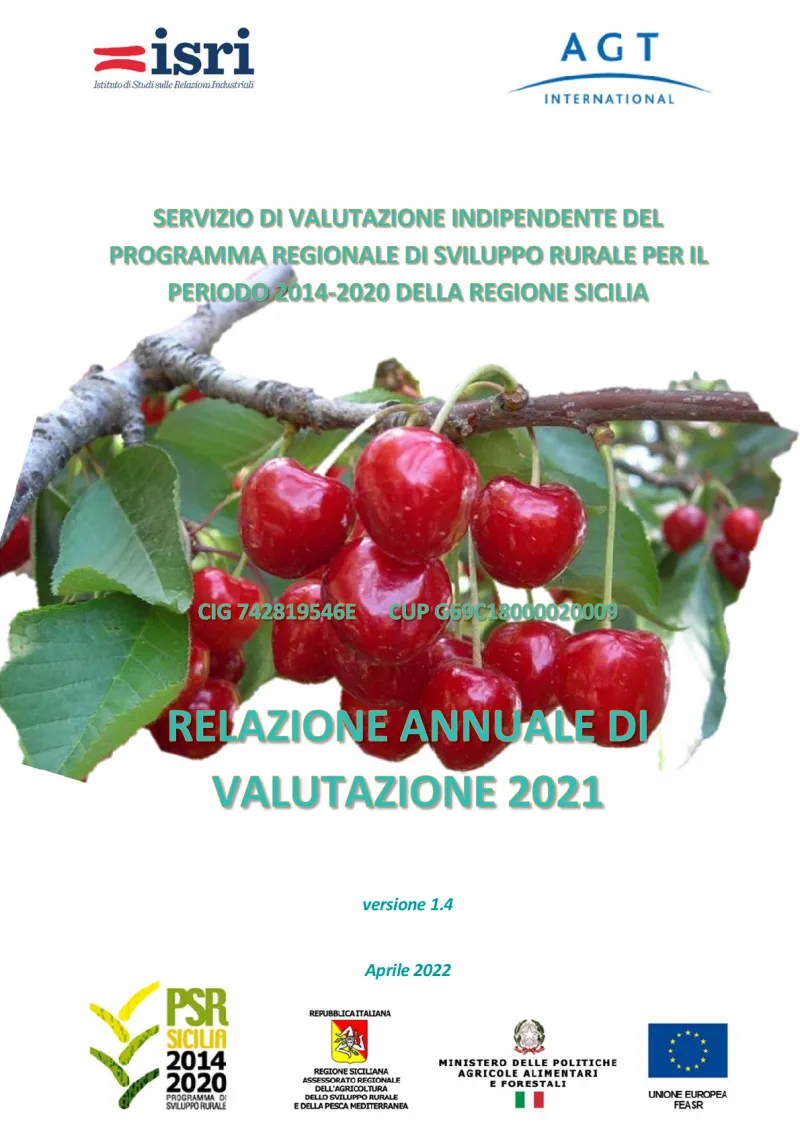2021 annual evaluation report of the Sicily region
The study reports on the implementation of the Sicily 2014-2022 Rural Development Programme (RDP).
- Italy
- 2014-2022
- Environmental impacts


In summary, this report contains the answers to the 30 questions from the common evaluation questionnaire, based on the information framework that was available at the end of May 2020.
For some focus areas (FA), the level of implementation does not allow an assessment of the effects. In these cases, the relevance of what is being implemented has been assessed.
The main results of the evaluation analysis are summarised below, divided into the main thematic areas.
The effects of innovation projects promoted by the 2014-2020 RDP are not currently assessed, as they are only at an early stage of implementation.
The RDP of the region of Sicily attaches great importance to generational renewal, with the aim of favouring the establishment of more than 1 600 new farmers, young and qualified and, above all, significantly supporting farm investments foreseen in development plans, with approximately EUR 195 million. Through the 'Youth Package', the RDP favours a generational leap in management responsibility and a consolidation of companies, but elements collected through the investigation indicate that it is an effect of anticipation and acceleration of a process destined to take place with the same actors.
Regarding restructuring and modernisation of agricultural holdings, around one-fifth of the resources foreseen for the related investments are absorbed by projects from the previous programming, which still represent a large part of the expenditure incurred today.
In terms of integrating supply chain and cooperation, it is highlighted that there is a very strong link between the companies that invest in processing and marketing and the territory's agricultural production.
Among the major environmental issues regarding which the RDP intervened with specific intervention strategies are the loss of biodiversity, the low quality of water (nitrate pollution and salinisation phenomena) and the poor quality of soils.
Regarding water use, the average watering values per hectare per irrigation system, calculated based on irrigation volumes and irrigated areas at the regional level, have been applied to those areas.
Furthermore, the RDP promotes the improvement of soil organic matter content, mainly through Measures (M) 10.1a, 10.1b and 11 (promotion of integrated, organic and eco-sustainable agriculture), as well as other sub-Measures of 10: M10.1f (production methods with reduced processing), M10.1c (conversion of arable land into pastures) and M10.1e (beams not cultivated along waterways).
Another important component is the decrease in emissions related to livestock activities, which is made possible by the limitations compared to the number of farmable animals provided for in M11.
In relation to the forestry sector, the reforestation financed by M8.1, which, however, covers limited areas, should be considered.
With the financing of the first interventions under sub-Measure 6.2, aimed at supporting the start-up of non-agricultural entrepreneurial activities in rural areas, the process of diversification of the rural economy and the creation of new employment opportunities was launched.
Although the implementation of the M19 is still in its early stages, the evaluation surveys carried out allowed for the identification of some distinctive traits of the application of the LEADER approach in Sicily.
Finally, the state of implementation of the programme is such that its contribution to the implementation of the Europe 2020 strategy is still largely theoretical. This is, in particular, due to its contribution to employment effects and investment in research and development.
Author(s)
Istituto di Studi sulle Relazioni Industriali (ISRI) ; AGT international
Resources
Documents
2021 annual evaluation report of the Sicily region
(PDF – 2.88 MB – 176 pages)